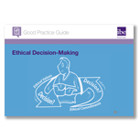Tags: Decision-making
Our behaviour, individually and collectively, is a result of our decisions. Consciously or not, we choose one action over one or more alternatives. Some actions are less ethical than others, often in minor details but sometimes in major ways that seriously violate the values that we seek (or at least claim) to live up to. In a business context, the consequences of getting things wrong can be catastrophic – but the impact of many poor small decisions can be significant too.
This guide is intended to help you understand the nature of ethical decision-making and to equip you to embed ethical considerations in organisational decision-making, including your own. The guide begins by connecting decision-making to ethical values, setting out the different stages of the decision-making process and how competence can be developed through reflection. Part 2 identifies some challenges to ethical decision-making in the form of over-confidence against a background of the unconscious biases to which we are prone. Part 3 examines how we can support good ethical decision-making using models or tools that provide useful prompts in the form of simple questions to work through, alone or with colleagues. Finally, as an aid to putting the material covered by this guide into practice, Part 4 provides a set of reflective questions, including questions aimed at managers and senior leaders.
Who is this Good Practice Guide for?
This good practice guide is aimed at anyone who wants to improve their own ethical decision-making and to support colleagues to improve theirs. It is designed primarily for managers, senior leaders, and practitioners with responsibility for developing and implementing an organisation’s ethics programme.
Acknowledgements
The IBE gratefully acknowledges the support of the KBA-NotaSys Integrity Fund for the translated guides.



